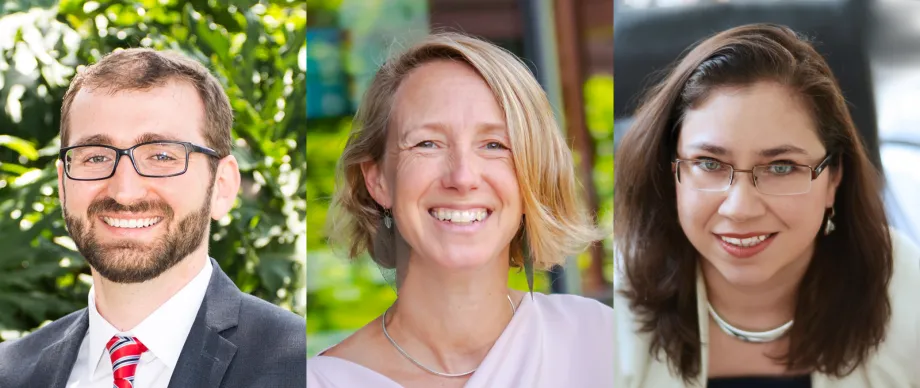
Stanford Bio-X affiliated faculty members Drs. Gheorghe Chistol, Polly Fordyce, and Julia Palacios.
Stanford Report - February 2nd, 2022 - by Megan Kalomiris
Gheorghe Chistol, assistant professor of chemical and systems biology; Polly Fordyce, assistant professor of genetics and of bioengineering; Fredrik Kjolstad, assistant professor of computer science; Julia Palacios, assistant professor of statistics and of biomedical data science; and Tselil Schramm, assistant professor of statistics, have each received a National Science Foundation (NSF) CAREER Award.
The NSF awards this grant to support early-career faculty who have the potential to serve as academic role models in research and education and to lead advances in the mission of their department or organization.
Chistol’s CAREER Award proposal is titled “Dissecting the Mechanism of Replication Initiation in Vertebrates via Single Molecule Imaging” and centers investigation of the earliest stages of DNA replication in vertebrates. Chistol plans to use single-molecule imaging to peer into the mysterious starting site of DNA replication and detail which proteins are involved. This project also aims to support training opportunities in biotechnology for high school students. Chistol is faculty in the School of Medicine and a member of Stanford Bio-X.
Fordyce’s proposal, “Leveraging Microfluidics for High-Throughput in Vitro Investigations of Transcriptional Regulation,” focuses on proteins, called transcription factors, that help to control the conversion of DNA to RNA, which is the blueprint instruction that translates DNA code for protein creation. Fordyce aims to crack the code of how transcription factor-DNA binding dictates the magnitude and timing of gene expression. This award will also support efforts to host local community college students at the Stanford Microfluidics Foundry. Fordyce is faculty in the School of Medicine and the School of Engineering, a member of Stanford Bio-X and the Wu Tsai Neurosciences Institute and an executive committee member of Stanford ChEM-H.
Highlighting how “society is increasingly dependent on scalable data analytics to solve societal and industrial problems,” Kjolstad’s proposal, “A Unified Compiler for Sparse Array Operations and Relational Algebra,” focuses on improving performance and efficiency of data analytics. For this project, Kjolstad seeks to create self-specializing software to tackle diverse, irregular data. Kjolstad is faculty in the School of Engineering.
Palacios’ “New Statistical Approaches for Studying Evolutionary Processes: Inference, Attribution and Computation” proposes the creation of a statistical model to analyze large, noisy genetic data present in research on evolutionary biology. This project will support the development of new statistical theories and methods, as well as provide educational and outreach opportunities for graduate and undergraduate students. Palacios is faculty in the School of Humanities and Sciences and the School of Medicine, and a member of Stanford Bio-X and of the Institute for Computational and Mathematical Engineering (ICME).
The goal of Schramm’s proposal, “Optimal High-Dimensional Estimators Using Sum-of-Squares Proof Systems,” is to develop powerful algorithms that are able to efficiently tackle complex statistical estimation problems, which underlie many machine-learning tasks and data analysis across various disciplines. Schramm will be developing these algorithms using sum-of-squares, a tool to determine the dispersion of data. Schramm is faculty in the School of Humanities and Sciences.



